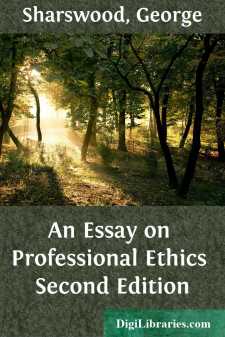Categories
- Antiques & Collectibles 13
- Architecture 36
- Art 48
- Bibles 22
- Biography & Autobiography 813
- Body, Mind & Spirit 142
- Business & Economics 28
- Children's Books 17
- Children's Fiction 14
- Computers 4
- Cooking 94
- Crafts & Hobbies 4
- Drama 346
- Education 46
- Family & Relationships 57
- Fiction 11829
- Games 19
- Gardening 17
- Health & Fitness 34
- History 1377
- House & Home 1
- Humor 147
- Juvenile Fiction 1873
- Juvenile Nonfiction 202
- Language Arts & Disciplines 88
- Law 16
- Literary Collections 686
- Literary Criticism 179
- Mathematics 13
- Medical 41
- Music 40
- Nature 179
- Non-Classifiable 1768
- Performing Arts 7
- Periodicals 1453
- Philosophy 64
- Photography 2
- Poetry 896
- Political Science 203
- Psychology 42
- Reference 154
- Religion 513
- Science 126
- Self-Help 84
- Social Science 81
- Sports & Recreation 34
- Study Aids 3
- Technology & Engineering 59
- Transportation 23
- Travel 463
- True Crime 29
An Essay on Professional Ethics Second Edition
by: George Sharswood
Categories:
Description:
Excerpt
INTRODUCTION.
The dignity and importance of the Profession of the Law, in a public point of view, can hardly be over-estimated. It is in its relation to society at large that it is proposed to consider it. This may be done by showing its influence upon legislation and jurisprudence. These are the right and left hands of government in carrying out the great purposes of society. By legislation is meant the making of law—its primary enactment or subsequent alteration. Jurisprudence is the science of what the law is or means, and its practical application to cases as they arise. The province of legislation is jus dare—of jurisprudence, jus dicere. The latter is entirely in the hands of lawyers as a body—the former almost entirely.
Legislation is indeed a nobler work than even jurisprudence. It is the noblest work in which the intellectual powers of man can be engaged, as it resembles most nearly the work of the Deity. It is employed as well in determining what is right or wrong in itself—the due proportion of injuries and their remedies or punishments—as in enforcing what is useful and expedient. How wide the scope of such a work! The power of society over its individual members, or, in other words, sovereignty, which is practically vested in the legislature, is a type of the Divine power which rules the physical and moral universe. "There is one Lawgiver," says the Apostle James. Not that the Supreme Being is the sole universal lawgiver in the sense of a creator of law, whose will alone determines the boundaries of right and wrong. God is the creator of the beings who are the subjects of law. He is the author of law—the one lawgiver—in the same sense that he, who first discovered a plain figure, may be said to be the author of all theorems, which may be predicated of it. He who first called attention to the curious curve, made by a point in the periphery of a wheel as it turns on the ground, is in a certain sense the discoverer of all the truths, which may be mathematically demonstrated in respect to it.
Law in its true sense is not the work of mere will—not an act of intellectual caprice. It is a severe and necessary deduction from the relations of things. The Divine legislator sees and knows these relations perfectly. He can draw no wrong deduction from them. He can make no mistake. Whatever laws have certainly emanated from Him are certainly right. This is the sense in which it is true that "there is one Lawgiver:" all others but attempt the work; He alone is competent to perform it. There is no mathematical certainty in our reasoning on moral as there is on physical relations. We know that the three angles of a triangle are equal to two right angles with an assurance we can never have in regard to any moral truth whatever. The Divine law is a deduction necessarily and mathematically certain as much so as any truth in geometry. Human law can aim only at such a probable deduction as results from a finite and imperfect knowledge.
The system of law delivered by Moses to the Jews deserves, therefore, the most careful study at the hands of all who believe him to have been a divinely commissioned lawgiver. These laws were not intended for any other people than the Israelites; they were adapted to their circumstances, climate, country, neighbors, to the period of the world when they were promulgated, and during which they were to prevail. They were certainly not meant as a model for any other form of government, for any other people, or for any other time. Many laws are to be found there which are unnecessary and superfluous if applied elsewhere. Many actions, innocent in themselves, are prohibited....


